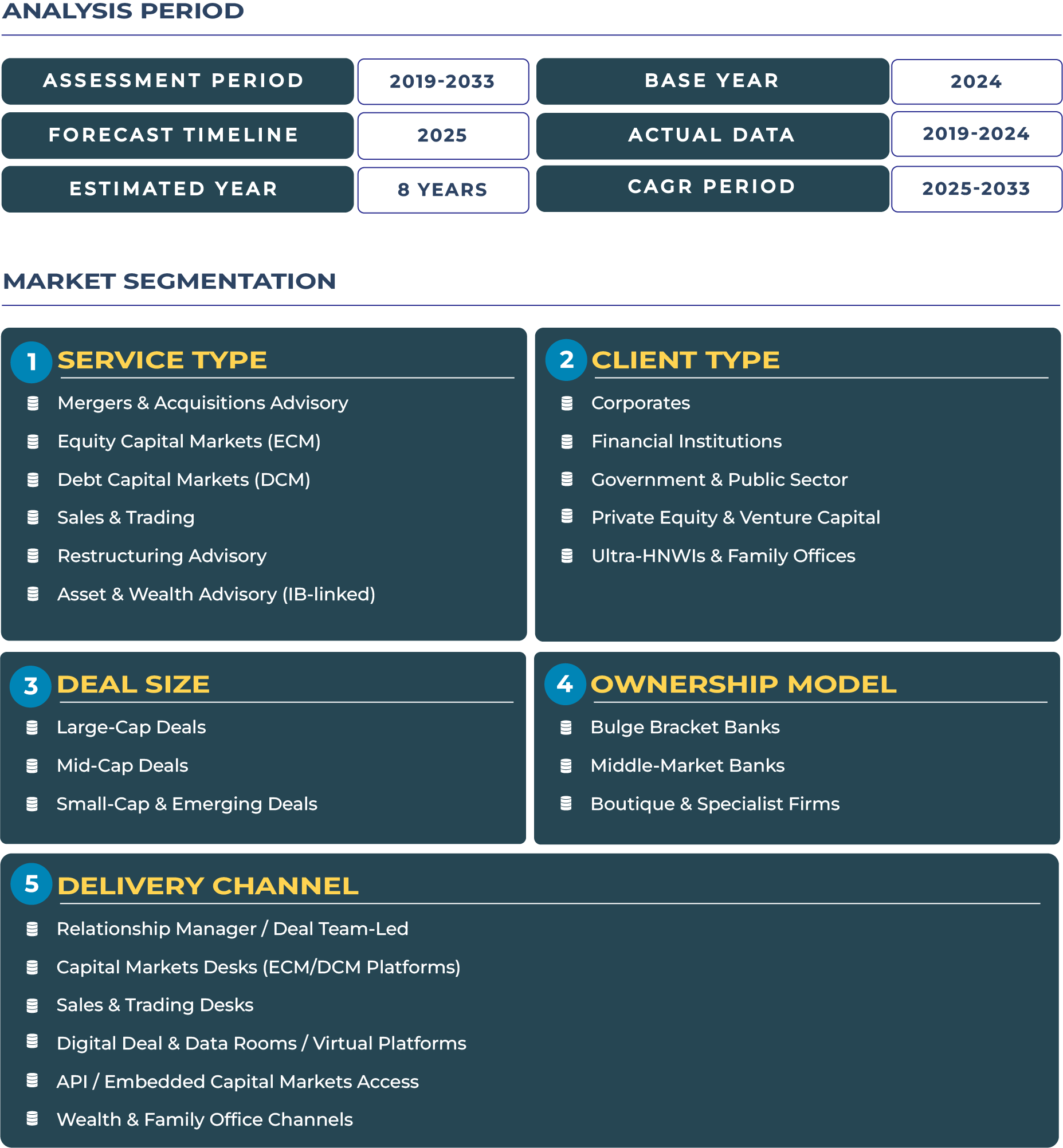Malaysia Investment Banking Market Outlook: Empowering Growth Through Islamic Finance and Cross-Border Advisory Excellence
The Malaysia Investment Banking Market is witnessing a phase of strategic expansion driven by the confluence of Islamic finance innovation and cross-border fintech advisory services. As the world’s leading hub for Sharia-compliant financial instruments, Malaysia continues to set benchmarks in structured corporate advisory, mergers and acquisitions, and sustainable financing. The market is estimated to reach USD 2.4 billion in 2025 and is projected to grow to USD 4.1 billion by 2033, reflecting an impressive CAGR of 7.1% from 2025 to 2033. This growth is underpinned by expanding demand for Islamic debt capital markets, digital financing innovation, and regional advisory services that link Southeast Asian economies.
Note:* The market size refers to the total revenue generated by banks through various services.
Malaysia’s strategic financial architecture, governed by the Bank Negara Malaysia (BNM) and the Securities Commission Malaysia, has been instrumental in maintaining a resilient and transparent investment banking environment. The country’s emphasis on sustainability, digital transformation, and capital market liberalization has enabled investment banks to diversify into asset management, equity capital markets, and cross-border financing. Additionally, its proximity to ASEAN growth corridors strengthens Malaysia’s positioning as a regional advisory hub for energy, infrastructure, and fintech transactions.
Drivers & Restraints: Core Forces Shaping the Malaysian Investment Banking Landscape
Islamic Finance and Corporate Financing Expansion Drive Market Performance
One of the most powerful growth catalysts in the Malaysian investment banking industry is the country’s leadership in Islamic finance. With over 60% of Malaysia’s total financing being Sharia-compliant, investment banks are leveraging sukuk issuances, structured corporate advisory, and Islamic equity financing to attract both regional and global investors. According to the Securities Commission Malaysia, Malaysia accounted for nearly 40% of global sukuk issuance value in 2023, reflecting its centrality in Islamic debt capital markets.
Investment banks have also capitalized on increased government spending on infrastructure and renewable projects, such as energy transition financing and industrial corridor development, to provide tailored merger and acquisition and project finance advisory. The expansion of green sukuk and ESG-linked instruments has further amplified the country’s appeal to institutional investors seeking sustainable yet Sharia-compliant products, reinforcing Malaysia’s global financial competitiveness.
Smaller Domestic Capital Markets and Liquidity Constraints Challenge Growth
Despite promising growth indicators, the Malaysian investment banking market faces structural challenges associated with its relatively limited domestic capital market size. Liquidity constraints, smaller deal volumes, and dependence on foreign capital inflows often restrict the scalability of investment banking operations compared to larger regional peers like Singapore. Moreover, global economic volatility and currency fluctuations have impacted corporate fundraising activity and delayed IPO pipelines.
Investment banks are increasingly adopting diversification strategies, venturing into cross-border debt syndication and digital financing, to offset these domestic constraints. However, sustaining profitability amid competition from foreign players and rising compliance costs remains a key restraint. The ongoing geopolitical uncertainty and fluctuating oil prices also exert indirect pressure on investment banking revenues linked to energy and infrastructure deals.
Trends & Opportunities: Digital Integration and Cross-Border Advisory Fuel a New Era of Investment Banking
Cross-Border Digital Finance Advisory Redefines Regional Collaboration
Malaysia investment banking sector is rapidly evolving through its participation in regional digital financial ecosystems. The rise of cross-border fintech advisory, facilitated by bilateral agreements within ASEAN, has opened new opportunities for deal origination and syndication across Indonesia, Thailand, and Singapore. This trend is aligned with Malaysia’s Malaysia International Islamic Financial Centre (MIFC) initiative, which encourages collaboration on digital sukuk, blockchain-based investment instruments, and Islamic fintech innovation.
Leading banks are incorporating technology-driven advisory platforms for faster due diligence, digital capital raising, and enhanced compliance transparency. These developments signal the integration of fintech into the traditional investment banking model, allowing Malaysia to maintain its edge in regional financial intermediation.
Regional Fintech and Infrastructure Advisory Create High-Value Opportunities
The Malaysian investment banking landscape is increasingly characterized by advisory mandates for large-scale regional projects in renewable energy, logistics, and digital infrastructure. With Kuala Lumpur emerging as a financial nerve center, investment banks are forming specialized teams to deliver SME financing advisory and infrastructure project syndication across ASEAN. Additionally, collaborations with government agencies and sovereign funds are enabling banks to facilitate greenfield investments and corporate restructuring in high-growth sectors.
These opportunities are amplified by the nation’s strong digital banking momentum and growing interest from Gulf Cooperation Council (GCC) investors in Southeast Asian Islamic finance. This synergy between fintech innovation, cross-border capital flow, and sustainable project financing positions Malaysia as a pivotal player in the evolving global investment banking landscape.
Competitive Landscape: Investment Banks Strengthen Islamic and Fintech Advisory Capabilities
The Malaysia investment banking market is defined by the presence of influential domestic and international players, including Maybank Investment Bank, CIMB Investment Bank, HSBC, and Standard Chartered. These institutions are focusing on expanding Islamic and cross-border advisory capabilities to capture growing demand in regional financial corridors. For instance, Maybank Investment Bank in 2024 enhanced its green sukuk advisory framework to support sustainable infrastructure financing, while CIMB launched new Islamic fintech investment products catering to cross-border clients.
Foreign institutions are also deepening their participation in Malaysia’s debt capital and merger and acquisition markets through strategic collaborations. By integrating fintech-based analytics, digital onboarding, and regional syndication models, banks are adapting to a more dynamic and inclusive financial ecosystem. The rising convergence between Islamic finance principles and fintech innovation is setting the stage for long-term market transformation and reinforcing Malaysia’s reputation as a global Islamic finance powerhouse.







